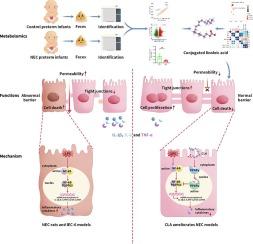共轭亚油酸通过 PPARγ/NFκB 信号通路抑制炎症反应并维持肠屏障完整性,从而改善坏死性小肠结肠炎的病情
IF 3.8
2区 农林科学
Q2 FOOD SCIENCE & TECHNOLOGY
引用次数: 0
摘要
坏死性小肠结肠炎(NEC)是一种影响早产儿的严重炎症性胃肠道疾病。通过粪便代谢组学研究,我们发现亚油酸化合物(LAs)在坏死性小肠结肠炎中减少,并与C反应蛋白和坏死性小肠结肠炎的贝尔分期呈负相关。共轭亚油酸(CLA)是一种特殊的亚油酸,具有多种功能。本研究旨在探讨共轭亚油酸在体内和体外的作用和机制。在新生大鼠体内的实验结果表明,CLA 能显著降低死亡率、减轻体重、改善病理评分、缓解炎症和保护肠道细胞稳态。在体外,CLA 能促进细胞增殖,减少细胞损伤。RNA 序列分析表明,PPAR 信号通路可能至关重要。实验表明,CLA 通过上调 PPARγ 的表达、使磷酸化的 NFκB 失活以及阻止 NFκB P65 的转位,促进了 PPARγ/NFκB 信号通路。这项研究强调了 CLA 的治疗潜力,并为开发 NEC 干预措施提供了新的见解和方向。本文章由计算机程序翻译,如有差异,请以英文原文为准。

Conjugated linoleic acid ameliorates necrotizing enterocolitis by suppressing inflammatory responses and maintaining intestinal barrier integrity via the PPARγ/NFκB signaling pathway
Necrotizing enterocolitis (NEC) is a severe inflammatory gastrointestinal disorder affecting preterm infants. Through fecal metabolomics, we found linoleic acid compounds (LAs) reduced in NEC and negatively correlated with C-reactive protein and NEC Bell stage. Conjugated linoleic acid (CLA) is a special kind of LAs with multiple functions. This study aims to investigate the role and mechanism of CLA in vivo and vitro. Experimental results in neonatal rats demonstrated that CLA significantly reduced mortality, weight loss, improved pathological scores, relieved inflammation and preserved intestinal cell homeostasis. In vitro, CLA promoted cell proliferation and reduced cell injury. RNA-sequencing analysis indicated that PPAR signaling pathway might be critical. Experiments showed that CLA facilitated PPARγ/NFκB signaling pathway by upregulating PPARγ expression, inactivating phosphorylated NFκB, and preventing translocation of NFκB P65. This study underscores the therapeutic potential of CLA and provides new insight and direction for developing NEC interventions.
求助全文
通过发布文献求助,成功后即可免费获取论文全文。
去求助
来源期刊

Journal of Functional Foods
FOOD SCIENCE & TECHNOLOGY-
CiteScore
9.60
自引率
1.80%
发文量
428
审稿时长
76 days
期刊介绍:
Journal of Functional Foods continues with the same aims and scope, editorial team, submission system and rigorous peer review. We give authors the possibility to publish their top-quality papers in a well-established leading journal in the food and nutrition fields. The Journal will keep its rigorous criteria to screen high impact research addressing relevant scientific topics and performed by sound methodologies.
The Journal of Functional Foods aims to bring together the results of fundamental and applied research into healthy foods and biologically active food ingredients.
The Journal is centered in the specific area at the boundaries among food technology, nutrition and health welcoming papers having a good interdisciplinary approach. The Journal will cover the fields of plant bioactives; dietary fibre, probiotics; functional lipids; bioactive peptides; vitamins, minerals and botanicals and other dietary supplements. Nutritional and technological aspects related to the development of functional foods and beverages are of core interest to the journal. Experimental works dealing with food digestion, bioavailability of food bioactives and on the mechanisms by which foods and their components are able to modulate physiological parameters connected with disease prevention are of particular interest as well as those dealing with personalized nutrition and nutritional needs in pathological subjects.
 求助内容:
求助内容: 应助结果提醒方式:
应助结果提醒方式:


